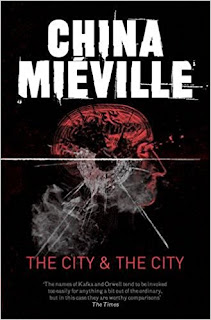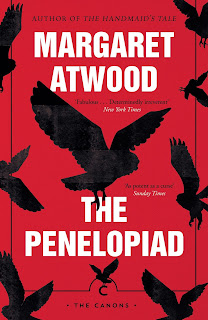The City and The City by China Mieville
 Mr Sci-Fi Conspiracy
Mr Sci-Fi Conspiracy
The City and The City by China Mieville is a noir crime story set in a pair of cities laid one on top of the other. Detective Borlu must cross the boundaries between Beszel and Ul Quoma to solve this crime before more people go missing.
Story ☆☆☆★★
I am not a fan of noir, even though it feels like something I should like. Again and again I try to get into Scandy-noir books, TV shows or films, and I just don't get it. So when I mentioned I was (finally) trying China Mieville and this was the one I was going to read and my friend said, "You'll like it, it's noir!" my heart sunk just a little.
As a crime story, it's not great. The book opens with the discovery of a mystery woman's body, dumped in a skate park, and the reader is introduced to Inspector Borlu who leads on the case. It's difficult, however, to really care about this dead woman. Even when her parents arrive to view her body, they seem more consumed by the alleged conspiracy than their daughter's actual death. None of the characters in the book care about her, so it's hard for the reader to invest in solving the crime.
When it comes down to the final suspects and the crime is solved, I was left scratching my head trying desperately to remember who they were talking about. Motives and means seemed tenuous, and I was left wishing Mieville had left the murder mystery out.
The author himself seems far more interested in the conceit of the two overlapping cities, which is an interesting basis but, again, the noir writing style works against it. Mieville clearly wants to pique the reader's curiosity about the mechanics of the dual cities, but spends the majority of the novel hinting and drip-feeding information, without satisfying any of the, "but why?" questions that are inevitably prompted.
Style ☆☆☆★★
The style of writing is not easy to penetrate at first, but then I often find this when switching between books. The City and The City, though, I think was made more difficult with the use of what I think of as Fantasy Language. Places and people have names that come from the author's head, rather than an existing recognisable culture, making it harder to remember who is who, where they are, and whether you've read any of these words before.
Mieville talks a lot in the novel about the differences between Beszel and Ul Quoma, how to tell them apart, the training that tourists must go through before being allowed to enter either city. Most of these differences, however, are visual. It may be that, for anyone better at languages than me (and in fairness, that would be most people), there may be recognisable linguistic differences between proper nouns, but not any that I could detect.
Borlu does work as an interesting narrator, once you get used to him. Most of the crime fiction cliches about detectives -- divorced, alcoholic, miserable estranged children, etc. -- are foregone, allowing Borlu to be a real person in this interesting location.
Substance ☆☆★★★
The City and the City sparked an interesting debate with my other half: the difference between sci-fi and fantasy genres. To me, the essential difference between sci-fi and fantasy is the mechanism by which fantastical things happen. If fantastical things happen because Magic, then it's fantasy. If fantastical things happen because of this possibly spurious but vaguely plausible scientific explanation, then it's sci fi.
It felt like The City and The City sat uncomfortably in the sci fi genre. The over laying cities were described with a layer of realism that suggested there was some kind of explanation for why and how the cities worked this way, but it was never satisfyingly explained. A scant non-explanation is given at the end, but left me with so many 'why' and 'how' questions -- and not in a good way.
The novel does some interesting things with ideas of national identity and the politics of patriotism that I liked -- but I felt could have been developed further. This novel would have been really interesting as an out-and-out political thriller instead of a murder mystery.
The real disappointment is the feeling that so much could have been done with this concept that wasn't. Artefacts such as maps of the cross-hatched cities and archaelogical finds from 'pre-cleavage' are described or referenced in brief, but it felt like this was a novel where a drawing or diagram of these would have been really handy.
The Verdict ☆☆☆★★
The concept of the setting of this book is the key thing. Plot and character come secondary, which is a pity, but with a concept as interesting as two cities or countries laid one on top of the other, you can kind of understand. However, I still don't think the concept itself was utilised or explored or explained as well as it could have been, and that's what really lets The City and The City down.


Comments
Post a Comment